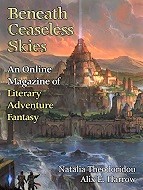 Beneath Ceaseless Skies #270, January 31, 2019
Beneath Ceaseless Skies #270, January 31, 2019
“To Stab with a Rose, to Love with a Knife” by Natalia Theodoridou
Reviewed by Tara Grímravn
Beneath Ceaseless Skies #270 brings us two short fantasy stories united by the theme of cultural norms and customs, especially those related to notions of love.
“To Stab with a Rose, to Love with a Knife” by Natalia Theodoridou
Driven from her home in Olvira by war, a girl finds herself working as a servant in a foreign land. The customs of her new home are strange and she misses those of her homeland. Soon, however, she starts to fall for another servant named Labrina. But Labrina has other dreams and desires—ones that stab our narrator like a rose.
The unnamed narrator in this story longs for a way of life that no longer exists while trying to find her place in her new surroundings. Through her, Theodoridou explores what happens when someone is uprooted from their homeland and thrust into a foreign way of life with different customs and values. It’s also an interesting look at symbolism and how the cultural meanings attached to them differ between groups.
“Do Not Look Back, My Lion” by Alix E. Harrow
Healer Eefa’s wife Talaan, a fierce warrior known as The Lion of Xot, is ever loyal to the empire. So much so that she has promised all of her children to the empress’ war efforts, marking them at birth as the property of the vicious goddess Ukhel. As Talaan prepares to bear her fifth child, she promises Eefa that the girl will be a healer like her, not a warrior like her mother and sisters. When the child is born, Talaan’s daughter Urv goes against her near-mother Eefa’s wishes and summons a priestess of Ukhel to mark the infant. Thus betrayed, Eefa must decide what to do next.
While Theodoridou’s character looks to the past with a longing, Harrow’s Eefa dreams of the future and a break with tradition and cultural norms. The tale explores ideas of love, loyalty, honor, and sacrifice through the religious fervor of a bloodthirsty nation and the effect it has, not only on its own citizens but also on those it seeks to conquer. In other words, it’s asks the question: is what you’re fighting for worth the sacrifice you’re making or the heartache your actions cause?
Personally, between the two, I prefer Harrow’s tale as I was able to connect a bit better with Eefa and Talaan. I also felt I had a more solid sense of place and what was at stake in Harrow’s story. Still, that doesn’t necessarily take anything away from Theodoridou’s tale. Both were quite enjoyable and I’m certain readers will find each of them as entertaining as I did.